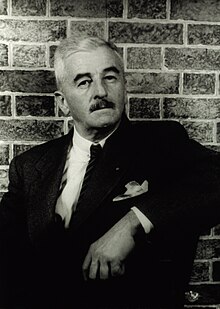
Back William Faulkner Afrikaans William Faulkner AN ويليام فوكنر Arabic وليام فوكنر ARZ William Faulkner AST William Faulkner AVK William Faulkner Aymara Vilyam Folkner Azerbaijani ویلیام فاکنر AZB Уільям Катберт Фолкнер Byelorussian
William Faulkner | |
|---|---|
 Faulkner in 1954, photographed by Carl Van Vechten | |
| Born | William Cuthbert Falkner September 25, 1897 New Albany, Mississippi, U.S. |
| Died | July 6, 1962 (aged 64) Byhalia, Mississippi, U.S. |
| Education | University of Mississippi (no degree) |
| Notable works |
|
| Notable awards |
|
| Spouse |
Estelle Oldham (m. 1929) |
| Signature | |
William Cuthbert Faulkner (/ˈfɔːknər/;[1][2] September 25, 1897 – July 6, 1962) was an American writer known for his novels and short stories set in the fictional Yoknapatawpha County, based on Lafayette County, Mississippi, where Faulkner spent most of his life. A Nobel laureate, Faulkner is one of the most celebrated writers of American literature and often is considered the greatest writer of Southern literature.
Faulkner was born in New Albany, Mississippi and raised in Oxford, Mississippi. During World War I, he joined the Royal Canadian Air Force, but did not serve in combat. Returning to Oxford, he attended the University of Mississippi for three semesters before dropping out. He moved to New Orleans, where he wrote his first novel Soldiers' Pay (1925). He went back to Oxford and wrote Sartoris (1927), his first work set in the fictional Yoknapatawpha County. In 1929, he published The Sound and the Fury. The following year, he wrote As I Lay Dying. Later that decade, he wrote Light in August, Absalom, Absalom! and The Wild Palms. He also worked as a screenwriter, contributing to Howard Hawks's To Have and Have Not and The Big Sleep, adapted from Raymond Chandler's novel. The former film, adapted from Ernest Hemingway's novel, is the only film with contributions by two Nobel laureates.[3]
Faulkner's reputation grew upon the publication of Malcolm Cowley's The Portable Faulkner, and he was awarded the 1949 Nobel Prize in Literature for "his powerful and unique contribution to the modern American novel."[4] He is the only Mississippi-born Nobel laureate. Two of his works, A Fable (1954) and The Reivers (1962), won the Pulitzer Prize for Fiction. Faulkner died from a heart attack on July 6, 1962, following a fall from his horse the month before. Ralph Ellison called him "the greatest artist the South has produced".
- ^ "Faulkner, William". Lexico.com. Archived from the original on September 24, 2021.
- ^ "Faulkner". Merriam-Webster.com Dictionary.
- ^ Phillips (1980), p. 50.
- ^ "The Nobel Prize in Literature 1949". NobelPrize.org. Archived from the original on June 2, 2020. Retrieved January 4, 2023.
© MMXXIII Rich X Search. We shall prevail. All rights reserved. Rich X Search